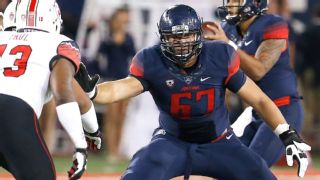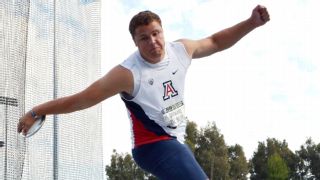|
TUCSON, Ariz. -- At first, his plan seemed simple enough. Gerhard de Beer, one of the top discus throwers in the world for his age, would leave his hometown of Pretoria, South Africa, for the United States and compete for an American university. And while he was there, he would sign up for the football team.  He had played a few games of Madden and watched a little football on TV. The sport looked like fun. Once he saw an aerial view of a college stadium, he was sold. He was a good athlete and had played rugby all his life. How hard could this football thing be? "I didn't realize how arrogant my statement was when I said I wanted to play college ball," de Beer said. "I thought it would be me going out for some team. I never realized it was this insanely big." Before college, he set national boys' U-16 and U-18 records in the discus and won a bronze medal at the World Youth and Junior Games. Several track programs recruited him, but Arizona's Rich Rodriguez was the only football coach willing to give him a shot. Rodriguez saw an athletic 6-foot-7 frame that easily carried 240 pounds and threw caution to the wind. Before his first practice, de Beer stood next to teammate Luca Bruno, a defensive lineman, and tried to make sense of the equipment in his locker. He couldn't. "How do you put these on?" de Beer asked. "You've never put on pads before?" Bruno replied, somewhat confused. "No." "Then why are you here?" He started his career as a defensive lineman, but it was clear right away that wasn't going to work and he switched to tight end. The results there weren't great, either. One time in practice, he lined up as a tight end in the slot in a three-point stance. "My teammates probably thought, 'What is this guy doing?'" he said. "Another time, the coach told me to go block the corner [meaning the defensive back], so I ran to the corner of the end zone looking for someone to block." In the middle of his first training camp, he left to compete at the African Junior Championships in Mauritius, a small island east of Madagascar, and when he returned after winning the gold medal, he made a permanent move to the offensive line. "We said, 'Let's put some weight on him and see if he could be an offensive lineman,' and so he gained like a sixth-grader," Rodriguez said. "He gained like 50, 60 pounds. Hardworking kid, has natural toughness, and the next thing you know he is a pretty good player." As de Beer worked to understand football, he faced similar challenges adjusting to American culture. It started with his short shorts. If his sheer size hadn't already made him stand out, his preference for really short, tight shorts made sure of it. The shorts are everyday fashion in South Africa, but drew confused looks and laughs in Tucson. In the four years since, de Beer has far exceeded everyone's initial expectations. He has developed into a reliable offensive tackle for the Wildcats and sparked intrigue from some NFL scouts, who have expressed interest to Rodriguez because of how far he has come in such a relatively short amount of time. De Beer has started five games at right tackle this year for a team that has gone 6-2 and debuted at No. 23 in the initial College Football Playoff rankings. But Rodriguez insists de Beer's best position might actually be one that he has never played in a game: punter. "I'm serious. He might be the best punter on our team," Rodriguez said. "He can bang it now. When he punts it, you can hear the difference. You don't have to see it to know." The main reason de Beer hasn't been given the opportunity to punt in a game yet is the optics of it. As awkward as a 6-7 offensive lineman in short shorts can be, for Rodriguez, having a 320-pound punter just doesn't look right, but he has slowly warmed to the idea -- de Beer has begged for a chance -- and says eventually it could happen in a game.  "The first time I punted in practice, they got me some fancy shoes and I hit a 75-yarder with a five-second hang time," de Beer said. "The [special teams] coordinator said, 'Welcome to the program,' but I didn't understand what that meant." With the Wildcats' track and field team, success came more easily. At the NCAA track and field championships in 2016, de Beer finished fourth and his best mark of the year -- 61.97 meters at the Tucson Elite Classic -- would have earned a gold medal at 2016 African Championships. He is a few meters shy of the Olympic qualifying standard (65.0), but should he ever turn his full attention back to the discus, Arizona throwers coach T.J. Crater believes it's plausible that he could compete in the Olympics. "In college, he's going against some of the best throwers in the world for their age and he's practicing maybe a third of the time they are specific to the discus," Crater said. "Throughout the year I coached him, I was constantly impressed with his physical abilities. Just what he was able to do based off feel and athleticism." De Beer is hoping those natural gifts will be enough to earn him a job in the NFL. When his track eligibility was up following the 2016 season, he put his discus training on hold. The way he sees it, he can always go back to the discus if a football career doesn't pan out. His parents have yet to see him suit for up for the Wildcats in person, but plan to visit for the final two games of the season: at Oregon and at Arizona State. He thought about having them come for Arizona's final home game, but it was more important to him that they experience the Territorial Cup. "I want them to see how much hatred is going on and how hostile the environment is," he said. "You're just out there for warm-ups and you've got people yelling at you, throwing ice at you. It's crazy." De Beer's first experience with a road game came at Arizona State when he redshirted his freshman year. He wasn't going to play, but he still took part in warm-ups and was caught off guard with what he heard from the fans. But he has certainly learned the intricacies of talking smack. "All of a sudden these guys are yelling at me. I was like, 'I haven't even played a snap of football and these guys already hate me. It was really funny," he said. "It's actually kind of cool. In that respect, I like away games more than I like home games because having your home fans cheer for you is really cool, don't get me wrong, but making 50,000 people shut up is way cooler."
|

